Norwegian Supercluster – course for the world’s oceans. BSSC supports the development of the ZEV
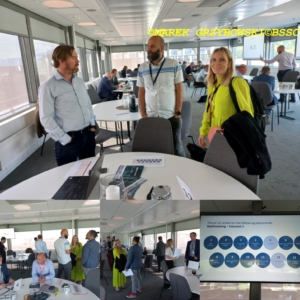

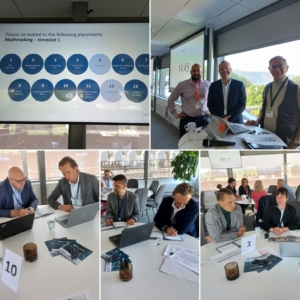
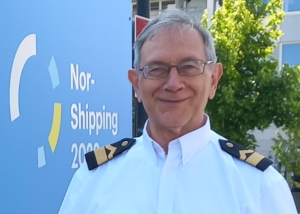 By Marek Grzybowski
By Marek Grzybowski
Maritime industries are evolving, and Norway has decided to take a leading place in the development and implementation of innovations and the development of a green economy. The western counties of Rogaland, Vestland and Møre og Romsdal are currently collaborating to create a new supercluster.
The fact that Norwegian clusters excel in taking up challenges related to the development of an environmentally friendly economy could be seen by Polish representatives of clusters, participants of the cluster trip organized by the department dealing with Norwegian grants at the Polish Agency for Enterprise Development.
Meetings at the headquarters of Innovation Norway in Trondheim, Bergen and Stavanger, as well as participation in the Floating Wind Days 2023 conference in Haugesund, provided a powerful dose of information about the Norwegians’ determination to create a green economy by implementing innovations in all possible fields of human activity. And because Norway is a maritime country, projects related to the development of maritime industries and everything related to maritime economy come to the fore.

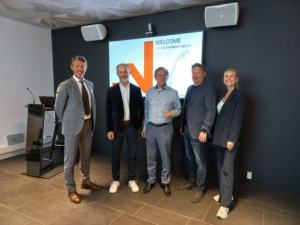
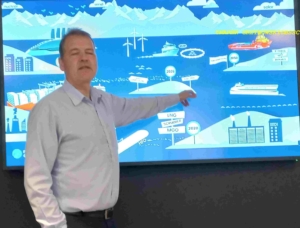
Polish and Norway Clusters Cooperation
The members of the Baltic Maritime and Space Cluster (BSSC) could see for themselves by participating in a project meeting with members of the Blue Maritime Cluster, which, due to its great achievements in the field of development and implementation of innovations in the maritime economy, was named the Global Center of Expertise.
For three years, the Polish cluster from Gdynia and the Norwegian cluster from Aalesund, together with partners from Croatia, have been developing ZEVinnovation HUB – a hub for the production of zero-emission ships, which includes the BSSC ZEV HUB.
The Baltic Sea and Space Cluster supported with professional presentations meeting under the title„Zero-emission technologies in the maritime economy”. The event was organized by the Polish Agency for Enterprise Development and Innovation Norway. The event included study trip in the Port of Gdynia, and business mixer with Norwegian companies during the largest maritime fair in Central and Eastern Europe: Baltexpo 2023 in Gdansk. This was the next ZEV project meeting organized by BSSC, which included about 50 companies interested in cooperation in the development of “Zero-emission technologies in the maritime economy”.
The very important meeting took place during the INTERMARE SOUTHBALTIC fair and conference on April 21, 2021. The second meeting of the ZEVInnovation Project Workshop in Poland was held in ASE Technolgy Group in Gdansk October 12th 2022. The third meeting of the ZEVInnovation Project Workshop in Poland was held in CRIST, October 13th 2022.
Its coordinator on the Polish side is CRIST. An important part of this activity is the Green Tech HUB, coordinated by the ASE Technology Group. It is a hub focused on creating onshore installations for an environmentally friendly maritime economy.
ÅKP with which BSSC cooperates in the ZEVinnovation project, initiated the first pilot cluster in Norway, coordinating the cooperation of Norwegian companies operating in the maritime industries. Due to its unique position on the global market and significant contribution to the creation of value in creating innovative projects in Norway, the cluster received the status of a Global Center of Expertise in 2014.
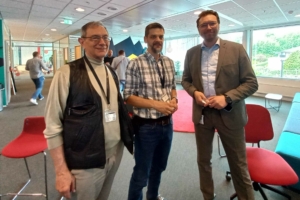

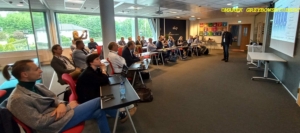
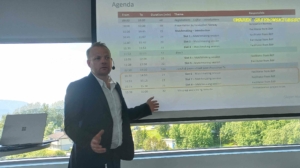
A cluster with potential
With the development of the GCE Blue Maritime Cluster, the industry has entered the path of coordinated activities of many companies from various sectors for the development of a green maritime economy based on innovation. In turn, innovations contributed to the acceleration of export production and a dynamic increase in revenues from the sale of innovative products. As a result, the total revenue of the cluster companies was estimated at NOK 58 billion in 2023. This was NOK 4 billion more than in 2022.
– The cluster program has had a positive impact on the coordination of companies in the maritime sector, accelerating the development of innovation by triggering the synergy of science and business with the activity of the administration. The leading programs include Digital Norway and Smart Innovation Norway – said Jan Børre Rydningen from the AKP at the meeting with Polish and Croatian participants of the ZEVInnovation project at the GCE Blue Maritime Cluster headquarters.
ÅKP is currently working with major clusters in Western Norway to further develop cluster cooperation in line with the business strategy of the West Norway Council (Vestlandsrådet).
“We can contribute to the continuous development of Vestlandet’s most important industry and export business by leveraging our experience over the past two decades,” explains Per-Erik Dalen, ÅKP’s CEO in the release.
Norwegian export accelerator
The Norwegians have a good base for accelerating cluster activities, because for some time they have been working on breakthrough solutions in maritime industries as part of the integrated activities of representatives of science, business, Innovation Norway and administration.
– More than a year ago, we launched the New Blue Deal, in which we strive to become the world’s first zero-emission maritime cluster – said Daniel Garden, CEO of the Blue Maritime cluster during a meeting with representatives of the Baltic Maritime and Space Cluster and partners of the ZEVinnovation projects from Croatia.
He emphasized that many entities around the world are looking for new, green, alternative fuels and energies that will propel the ships of tomorrow. You can read more about it on the pages of GospodarkaMorska.pl
Supercluster course
The three western regions, Rogaland, Vestland and Møre og Romsdal, have recently launched an initial project to create a new supercluster focused on the development of maritime industries. The new group of clusters will not replace existing clusters, but will serve as a superstructure that will enable member companies to benefit from all activities within the supercluster and will not be limited to local initiatives.
The megacluster is to effectively connect many clusters that will complement each other, creating a strong national value chain. The aim of this project is to accumulate the potential to significantly increase Norway’s competitiveness and strengthen its position on the market.
‘The the western counties of Rogaland, Vestland and Møre og Romsdal have a common business strategy based on the Council of Western Norway (Vestlandsrådet) which will enable them to achieve their national ambitions,’ said Per-Erik Dalen, CEO of ÅKP.
The initiators of the project recognized the potential of the Norwegian ocean industry and the benefits that can be obtained [from cooperation – MG] to achieve some of the goals of the strategy [increase in exports and development of the green economy – MG]. As a result, action was taken and the development of the first supercluster in Norway was funded.
The clusters intend to follow the path that the director of the Norwegian cluster spoke about at the meeting of clusters from Poland, Norway and Croatia.
– We are looking at new energy sources that must be low-carbon and zero-emission. It is important not only how we produce them, but also how we store them and how we create the infrastructure for them. In addition, we conduct research on energy consumption in ships. We test not only engines and generators, but also measure the consumption of energy that goes to the ship and where we can save – explained Daniel Garden.
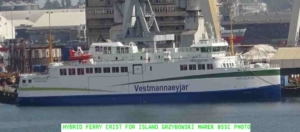

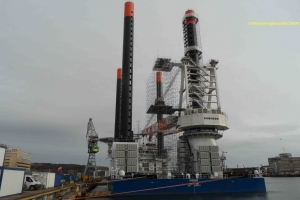
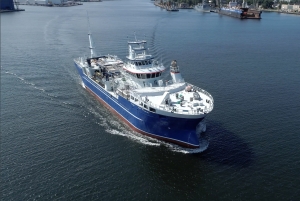
Marine industry potential on an oceanic scale
Norway has every basis to develop an ocean industry taking advantage of the maturity and expansiveness of Norwegian maritime clusters. Built over the years, with strong support from the state, the maritime industrial ecosystem creates a comprehensive and complete value chain. Its base is a network of regional clusters. The system is made up of Norwegian ship designers, shipyards, equipment suppliers, shipowners, management companies and technology developers.
They provide the international market with world-leading products, systems and services in terms of innovation potential. Importantly, there is a demand for them despite the high price. They enable customers and partners to qualitatively redevelop maritime transport and logistics services. Thanks to the introduction of new solutions, new constructions are ecological, safer, more specialized and economical in operation.
The beneficiary of these innovations is also the Polish shipbuilding industry, which is the final contractor of projects developed in Norway. For example, the ferry NB 70 Herjólfur produced at the Crist shipyard for a recipient from Iceland was equipped with a battery system from the Norwegian manufacturer Corvus Energy.
In addition to the series for the Finnish shipowner and the partnership in the construction of the Color Hybrid tourist vessel for the Norwegians, it was another hybrid vessel that used technologies developed in Norway.
Cluster as an innovation accelerator
Currently, Norwegian maritime clusters focus on the development of technologies related to the construction of ships with electric and hydrogen propulsion, but also on ammonia and hydrogen. Unmanned ships and control centers are being developed. There are also projects related to the use of IT and satellite systems in maritime transport.
Norwegians are undoubtedly leaders in the development of technologies related to food production in fish farms and energy production from stationary and floating offshore wind farms. The offshore industry related to oil and gas extraction is still being improved.
It can be said that in the Norwegian maritime cluster, innovation chases innovation. By creating a maritime megacluster, Norwegians are again ahead of others in the mechanism of accumulating intellectual and financial potential for the creation of a green maritime economy.
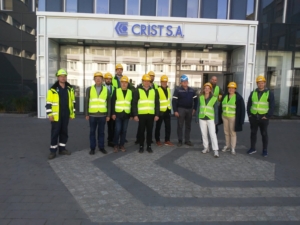
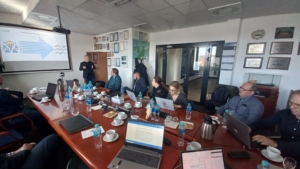
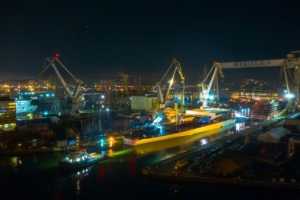
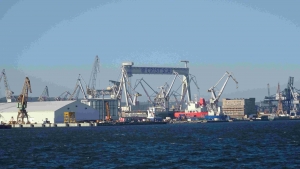
The strength of Polish-Norwegian cooperation
Poland also has a chance to participate in this process, if it does not miss the opportunities and opportunities inherent in cooperation with an economy with high innovative potential, both in technology and the organization and financing of projects.
During the meeting of Clusters from Poland, Norway and Croatia in Alesund, attention was drawn to one more important aspect of the rapid transition of transport to alternative fuels and the implementation of innovations in the maritime economy.
Erlend Redal, presenting the activities of AKP, the company that organized the meeting, drew attention to cooperation and partnership, which accelerate the search for environmentally friendly solutions.
On the example of the AKP, Erlend Redal showed the effectiveness of cooperation between science, business and administration. On the other hand, it was particularly important to indicate partnership in the search for cooperation paths during meetings between representatives of clusters from different countries.
